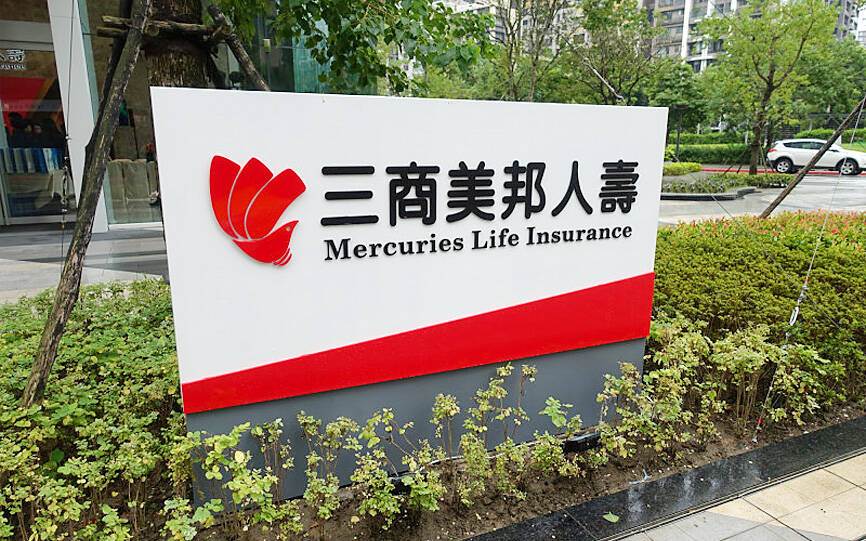The Financial Supervisory Commission (FSC) has banned Mercuries Life Insurance Co (三商美邦人壽) from trading with or granting credit to interested parties, and demanded detailed capital enhancement measures within a month to meet regulatory requirements.
The punitive measures do not affect old deals and should not cause substantive damage, but they should help the Taipei-based insurer improve its capital strength in a timely fashion, Insurance Bureau Deputy Director-General Tsai Huo-yen (蔡火炎) told a media briefing on Thursday.
Mercuries Life at the end of last year had a risk-based capital ratio of 111.09 percent and a net worth ratio of 2.97 percent, lagging behind the required minimums of 200 percent and 3 percent respectively, Tsai said, adding that the inadequacy dates back to the second half of 2022.

Photo: Wu Hsin-tien, Taipei Times
The remedial measures the company filed in May would not correct the inadequacy this year and beyond, not to mention the grave uncertainty involved, he added.
Mercuries proposed enhancement measures including the transfer of real estate as investment, the issuance of 300 million new common shares, the issuance of special debts through private placement, and the issuance of NT$5 billion (US$153.56 million) in subordinated bonds, Tsai said.
The official further cited the insurer as saying that the company plans to complete the issuance of common or special shares and convertible bonds next year and then conduct a review if supplementary measures are needed.
However, Mercuries Life has not yet inked a deal with potential investors over the timetable for share issuances and other details, raising doubts it could obtain the needed funds by the end of this year, Tsai said.
Even if all things were to go smoothly, the cash injection would only lift the company’s capital by a maximum of 30.4 percentage points to 180.4 percent, still below the 200 percent benchmark, the official said.
The insurer must come up with more concrete remedies detailing how and when it would comply with the capital requirements, Tsai said, adding that the commission would otherwise deal out further punishments.
Mercuries Life said it is working hard and has gained headway in bolstering its capital and protecting the interests of shareholders and policyholders.
Net income in the first half totaled NT$6.32 billion, or earnings of NT$1.24 per share, raising its net worth ratio to 3.34 percent and its risk-based capital to 150 percent, meaning the remedial measures would work if carried out successfully.
The financial improvement came from stable increases in fixed income and capital gains, bolstered by stock market rallies at home and abroad, the insurer said.
Profit improvement should be sustainable in the second half, as the US Federal Reserve is widely expected to lower interest rates toward the end of the year, which would be favorable to its bondholdings, it said.
Currency hedging costs would remain high in the short term, and the company would maintain active and balanced wealth management practices by guiding more cash to blue-chip stocks and add foreign debt without straining its liquidity, it said.

Vincent Wei led fellow Singaporean farmers around an empty Malaysian plot, laying out plans for a greenhouse and rows of leafy vegetables. What he pitched was not just space for crops, but a lifeline for growers struggling to make ends meet in a city-state with high prices and little vacant land. The future agriculture hub is part of a joint special economic zone launched last year by the two neighbors, expected to cost US$123 million and produce 10,000 tonnes of fresh produce annually. It is attracting Singaporean farmers with promises of cheaper land, labor and energy just over the border.

US actor Matthew McConaughey has filed recordings of his image and voice with US patent authorities to protect them from unauthorized usage by artificial intelligence (AI) platforms, a representative said earlier this week. Several video clips and audio recordings were registered by the commercial arm of the Just Keep Livin’ Foundation, a non-profit created by the Oscar-winning actor and his wife, Camila, according to the US Patent and Trademark Office database. Many artists are increasingly concerned about the uncontrolled use of their image via generative AI since the rollout of ChatGPT and other AI-powered tools. Several US states have adopted

A proposed billionaires’ tax in California has ignited a political uproar in Silicon Valley, with tech titans threatening to leave the state while California Governor Gavin Newsom of the Democratic Party maneuvers to defeat a levy that he fears would lead to an exodus of wealth. A technology mecca, California has more billionaires than any other US state — a few hundred, by some estimates. About half its personal income tax revenue, a financial backbone in the nearly US$350 billion budget, comes from the top 1 percent of earners. A large healthcare union is attempting to place a proposal before

KEEPING UP: The acquisition of a cleanroom in Taiwan would enable Micron to increase production in a market where demand continues to outpace supply, a Micron official said Micron Technology Inc has signed a letter of intent to buy a fabrication site in Taiwan from Powerchip Semiconductor Manufacturing Corp (力積電) for US$1.8 billion to expand its production of memory chips. Micron would take control of the P5 site in Miaoli County’s Tongluo Township (銅鑼) and plans to ramp up DRAM production in phases after the transaction closes in the second quarter, the company said in a statement on Saturday. The acquisition includes an existing 12 inch fab cleanroom of 27,871m2 and would further position Micron to address growing global demand for memory solutions, the company said. Micron expects the transaction to